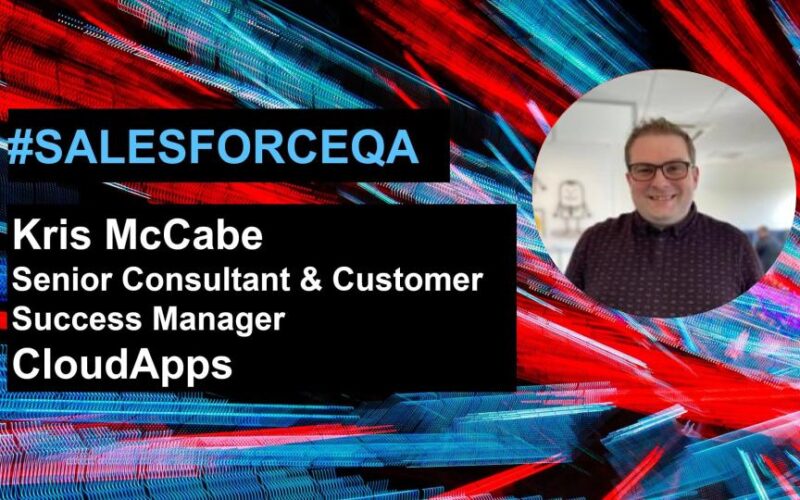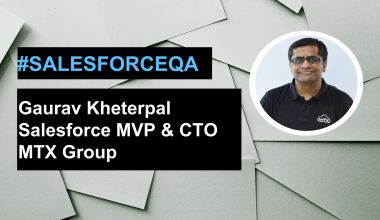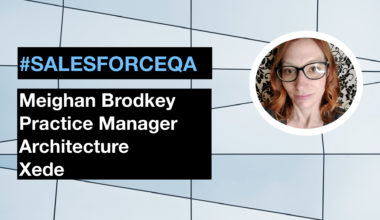In our most recent #SalesforceQA, we caught up with Kris McCabe, Senior Consultant and Customer Success Manager at CloudApps. Kris talks about how the Salesforce world has changed during the time he has worked in it, as well as the biggest challenge he’s found when helping organisations gain value from their Salesforce implementation. Kris also offers his top tips for people looking to improve their leadership management.
Salesforce Republic (SR): You’ve had quite a varied career, working in and out of Salesforce, could you talk a bit about why you decided to work in the ecosystem?
I decided to work in the ecosystem in 2014. Being a Sales Manager through a recession was quite challenging, and I wanted a change. I was offered the opportunity to become Group Data Manager for BCS, The Chartered Institute for IT. Once in the role, the decision was made to move the existing CRM systems to Salesforce. As part of the implementation, I was recommended by a Salesforce Partner to complete the week-long ADM201 course (training for Salesforce Admins) at Salesforce offices in Staines. When I was completing the Salesforce Admin course, I learnt so much about the platform, and I took that knowledge back to my first implementation project. Once we went live, it was great to see our sales users use Salesforce; getting the most value out of it. It sparked a new passion. Salesforce maximises the value to both business users and customers. Watching this in action, knowing I made a significant impact in helping the company grow within Salesforce, I knew this is why I chose to learn more and to share my knowledge, experience, and skills. Salesforce became my platform of choice.
SR: How has the Salesforce world changed in your time working in it?
As Salesforce progressed, through acquisitions with other companies, there’s been a lot more functionality added to the platform. At the time when I started it was Salesforce Classic all the way, and whilst that was great and the experience was well-known to be an unparalleled experience compared to some CRMs for users, it changed its user interface to the Lightning Experience. In the early days, I found that some companies find it difficult to adopt, because it’s a different way of working for users, where it’s more event-driven than just a database of contacts.
The other thing that I think has changed a lot in the ecosystem is the support that’s out there for the community. In particular, Trailhead has come along and helped many users from different backgrounds, who may not have had the idea to consider this role, to become those certified admins, those certified developers. I think what makes Salesforce special is that they do invest in the people using the platform, it’s not just a piece of software that you use, it’s also about adding value to those who are using the platform and powering businesses forward to further growth.
SR: Are there any particular events or groups that you are part of in the ecosystem?
I go to quite a lot of the events in the UK, one particular event is the Salesforce World Tour. The thing I like about that event is that it’s a great way to get hands on with all the products that are on showcase within the Salesforce ecosystem. It’s also a great place to come back to catch-up with colleagues that you’ve worked with in the past, or you may be partnering with. As a consultant, it’s great because it builds a relationship with other consultants and other Salesforce admins out there, and I’ve made some really great friendships as well.
There’s community events I attend and the good thing about those is you get to hear different stories about how people have used Salesforce, how they’ve managed to make it work and add value to their business. Also, it’s just great to know people, there’s quite a number of pioneers in the community that I’ve worked with or listened to, who’ve been inspiring and they make me want to do more as well. I regularly offer my help to others who are at different levels in their career too. It’s not a one-way street where you only take something from the community, you can also give back as well and help others succeed. This for me is a core value of being part of the Salesforce Ohana.
SR: You are also a trainer in leadership management and people development, could you talk a bit about that?
I’m a volunteer for The Scout Association, helping young people gain crucial skills for life. My current role is Local Training Manager for my local area, and I am national trainer in leadership, management and people development. These skills and experiences transfer across to my work in my professional career. I must admit, it wasn’t by design that I would specialise in developing and coaching people, but I’ve somehow accumulated enough knowledge to be deemed an ‘expert’, through a mixture of attending courses and learning from past experiences. How does that translate to the work that I do? It gives me a greater understanding as to what business leaders go through, the decisions they have to make, but also, an appreciation that whatever solution we design, whether it’s a third-party solution or a Salesforce driven one, it’s got to work for the business and the business leaders have got to get behind that, along with the users as well.
Often I find that technology seems to be the most important thing in a project, and it really isn’t, it’s the people who are. There’s a mantra that I have which is: People Powers Process, and Process Powers Technology. It never works when you run a project culture where Technology Powers Process, and Process Power People. If you put the technology first, your projects can fail quite quickly because if you do not bring people with you first, it doesn’t matter what technology you put in place – no one will understand the value that can be gained, fuelling a culture of resisting change. The leadership and management side of me takes great care about how people will perceive new technologies and how they will handle change. But also, it puts me in an ideal position why I can talk technically to the technical team and I can talk to the business side as well, almost like being a ‘translator’ between the two.
SR: What are your top tips for people looking to improve their leadership management?
There are plenty of great leaders out there. They are tough to find, but if you have a leader that is good at inspiring people whilst delivering projects successfully, don’t be afraid to ask them for help and advice on how to be an inspirational leader. Also, the Salesforce Ohana is a brilliant place for self-development and I think that’s why it’s so successful, because there are different kinds of people, with different experiences and backgrounds, and there’s plenty of role models out there to choose from who are either an MVP, pioneers or people who have experiences you can learn from. There’s always someone inspirational you can look to in the community.
There’s also this school of thought that leadership is a born skill; it’s not. Leadership is a skill that you learn, in the same way that you learn to drive. You have to have the experience, you have to look at what the best practices are for leading people, and I think the biggest part is about empathy. Having an understanding that people will have different ideas, different opinions, different backgrounds, and being able to balance that whilst keeping people on task, and keeping people motivated is a key skill to learn. I think the reason I like leading people is because it is about empowering your people to grow. And finally, any good leader should also be prepared to recognise their own weaknesses. If you find a leader that has all the answers and knows it all, it’s a facade. Remembering that you are fallible and owning your mistakes is key to learning from them. If mistakes are made that’s okay, that’s how we evolve and that’s how we become better as leaders (and people).
SR: What is the biggest challenge you’ve found when helping organisations gain value from their Salesforce implementation?
The biggest challenge that a lot of businesses face when it comes to implementations is Salesforce adoption. This stems from more non-technical reasons, and that’s because as human beings we’re not necessarily averse to change but we find it difficult to accept new things. There’s also a whole host of reasons why that might be and a lot of that is around life experience. Why that is quite difficult is because, often when we do implementations, we think about the technology-end very well, we think about the processes pretty well, but we forget our people. I have witnessed projects where a business spends a lot of money on the technology, thinking by doing so that people will instantly take to it like a duck to water. However, once it’s gone live – people are confused or unsettled by this new tool because they were not brought onboard with the change. You need to get people understanding why they are needing to change and most importantly – how that is going to add value to them.
That’s why Salesforce is successful, because it’s about being flexible to the needs of the business and being agile enough to meet the needs not only of the customer but also to the users who interact with the platform regularly.
SR: Has the current remote working environment impacted how you help organisations with their Salesforce platform?
There has been some change around the remote working environment. For me, it’s different because I work remotely all the time by nature, I get to go to different sites most days. But I think from a company level, what I have seen is that a lot of people are starting to look at better ways to do business through remote and digital channels. I think the need for that face-to-face interaction is less at the moment because of the amount of technology we have around us to allow work to continue. Whether that will continue will depend on the nature of the business, the impact it has on maintaining good mental health on staff, and being able to maintain good relationships with customers and people within the business. I have also found that a lot of people have revolutionised their businesses, whether that’s investing in new technology, or prioritising values in terms of making sure that people are motivated and are continuing to work productively. The remote working environment has become a preferred option to businesses who’ve seen increased productivity and are now able to restructure budgets, such as scaling down office locations. I think Salesforce has a big role to play in that because there’s no infrastructure maintenance to worry about, it’s flexible to extend the platform with ease meaning businesses are taking the opportunity to take stock of how their platform works, how things are working today and how we can make them more efficient.
SR: Finally, you are 4x Salesforce certified, what advice would you give someone considering a Salesforce certification?
I would give three key pieces of advice; the first one is to go for it. All to often, I have found people who look at gaining a certification and go; ‘that’s a really hard mountain to climb, I don’t know if I can do it’. Just go for it! Don’t think too much about it. You won’t know how much you really know until you put your flag down in the sand. Once you get that feedback, you will confirm how much you know and if you failed or didn’t do too well in a part of the exam you will know what areas of knowledge you need to improve. This leads to my second piece of advice; don’t be afraid to make a mistake, or fail. It’s important that you learn from those mistakes and failures so that you can do better. The thing I like about certifications, is there’s so much rigor that goes into writing them, that you do know what you are talking about, you are an expert in those domains. This will boost your confidence and help your business understand where you can add value to projects. The third piece of advice; always be learning. The journey doesn’t stop when you pass your exam. Always look for opportunities around you to try something new, maybe even challenging, to help you grow your understanding. This doesn’t have to be within the Salesforce ecosystem either – learning about other applications that work well with Salesforce and becoming an expert in them will help you stand out.
If you’re a Salesforce professional and would like to join Kris McCabe, in our Q&A series, please get in touch with us today!


